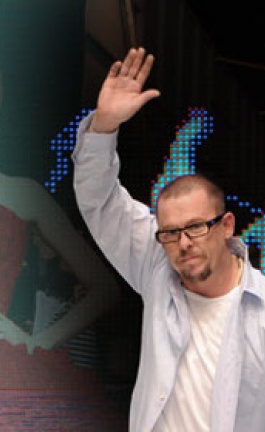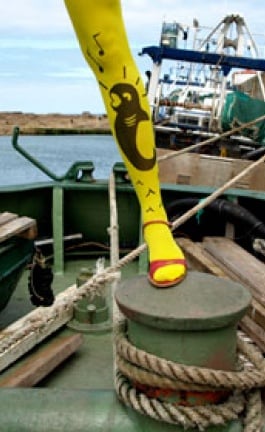The artist in his studio between: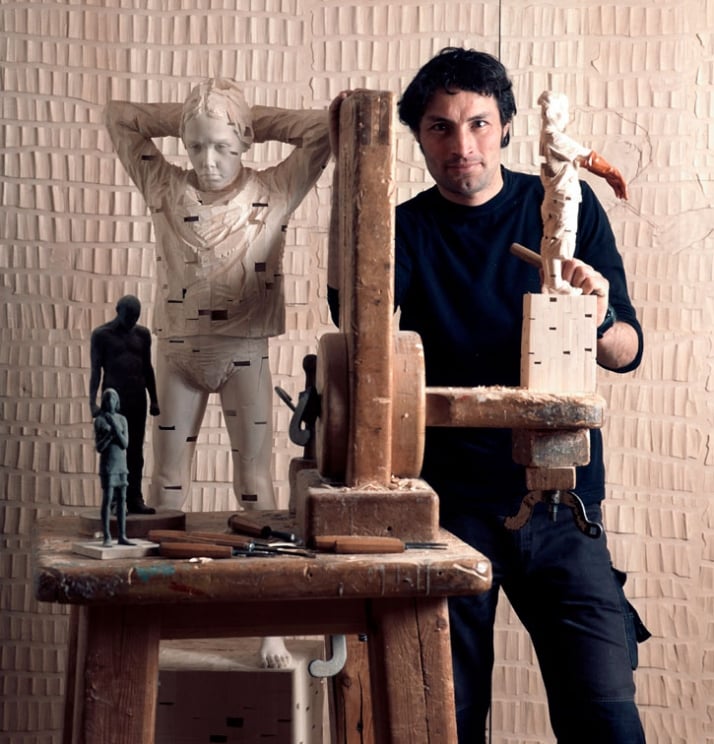
"Just one step behind", © Gehard Demetz, 2007, wood, 160 x 40 x 40 cm (on the left)
and "Everything he lied was true", © Gehard Demetz, 2006, wood, 50 x 11,5 x 11,5 cm (on the right),
Courtesy Galleria Rubin, Milano,
Photo by Ferdinando Cioffi // www.ferdinandocioffi.com
They say that the murderer always returns to the scene of the crime and Yatzer admits to have sinned for good with the case of Gehard Demetz. Some months ago we presented his spectacular sculptures at Yatzer (The dark celebration of Gehard Demetz // 01 October 2009), and they became one of our bigest success, with thousands of people visiting our site and letting dozen of passionate comments (read some more comments here). Since we are big fans of his unique work and due to your demand we found Gehard Demetz and convinced him to give us an exclusive interview. Wishes do come true and as you can imagine we couldn’t be any happier. The only thing left now is for you to discover his answers, hoping that they may cast a light on his enigmatic work. And if you are planning by coincidence to visit Madrid these days, you certainly should not miss the opportunity to see Gehard Demetz’s sculptures in person and visit his latest exhibition at gallery Raquel Ponce (11 February -27 March 2010).
Gehard Demetz is represented by galleria Rubin, Milano / Italy.
"First snow in Israel", © Gehard Demetz, 2009, wood, 171 x 71 x 58 cm,
Courtesy Galleria Rubin, Milano,
Photo by Egon Dejor
"I have dreamed in German", © Gehard Demetz, 2009, wood, 172 x 71 x 58 cm, 
Courtesy Galleria Rubin, Milano,
Photo by Egon Dejor
Well, Gehard, how did your adventure start?
My interest in sculpture goes back to my childhood, when I was enchanted by those huge religious statues. In Val Gardena there is a consolidated artistic tradition of sculpting that goes back more than three hundred years. Everyone thinks this tradition of wood sculpture came from Poland. I spent the first six years of my training as a sculptor in the Art School in Selva, the village I was born in and where I live today. In 1996 I started teaching sculpture in the Sculpture School in Selva where I taught for ten years. During that time I concentrated on my development as an artist, following academic courses in Salzburg and doing individual research. With the passing of the years and all those changes this inevitably entails, I realized that teaching took too much energy away from my creative work and I decided to stop working as a teacher.
"For my fathers", © Gehard Demetz, 2009, wood, 260 x 90 x 51 cm, // detail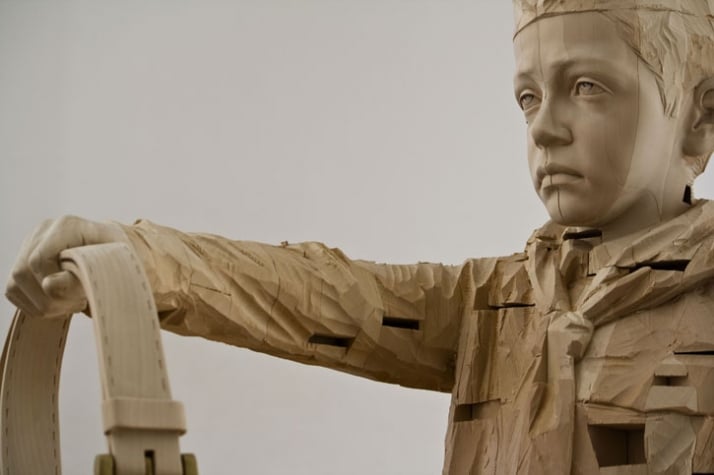
Courtesy Galleria Rubin, Milano,
Photo by Alice A. Bosoni
"For my fathers", © Gehard Demetz, 2009, wood, 260 x 90 x 51 cm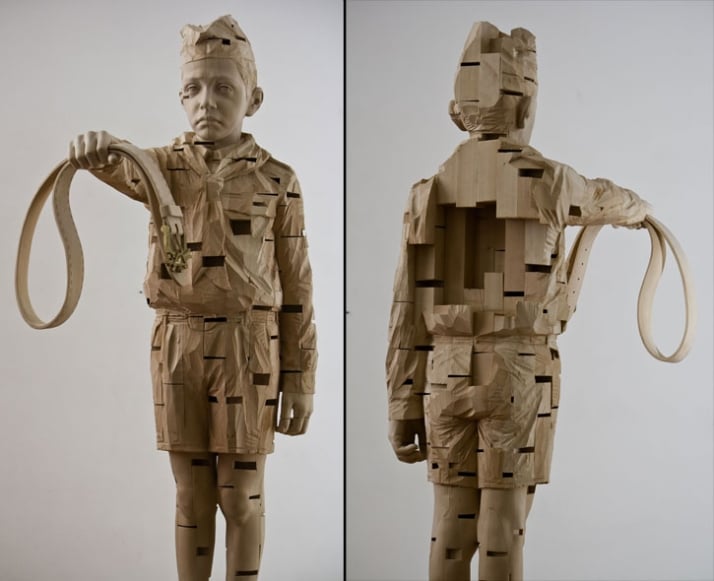
Courtesy Galleria Rubin, Milano,
Photo by Alice A. Bosoni
Since everyone is keep on asking us about it, how do you manage to make wood look almost like marble? Do you use any special process?
My work is classical wood-carving with carving steels, mallet and motor-saw. My sculptures are made piece by piece and the building up of the wooden elements I use recalls the logic used in computer science. This sort of process lets me add things and sculpt, take things away and sculpt, with a clear advantage over traditional sculpture.
"Forgive me if coudn't handle", © Gehard Demetz, 2009, wood, 173 x 33 x 38 cm // details
Courtesy Galleria Rubin, Milano,
Photo by Martino Gerosa // www.flickr.com/photos/martinogerosa
"Forgive me if coudn't handle", © Gehard Demetz, 2009, wood, 173 x 33 x 38 cm // back detail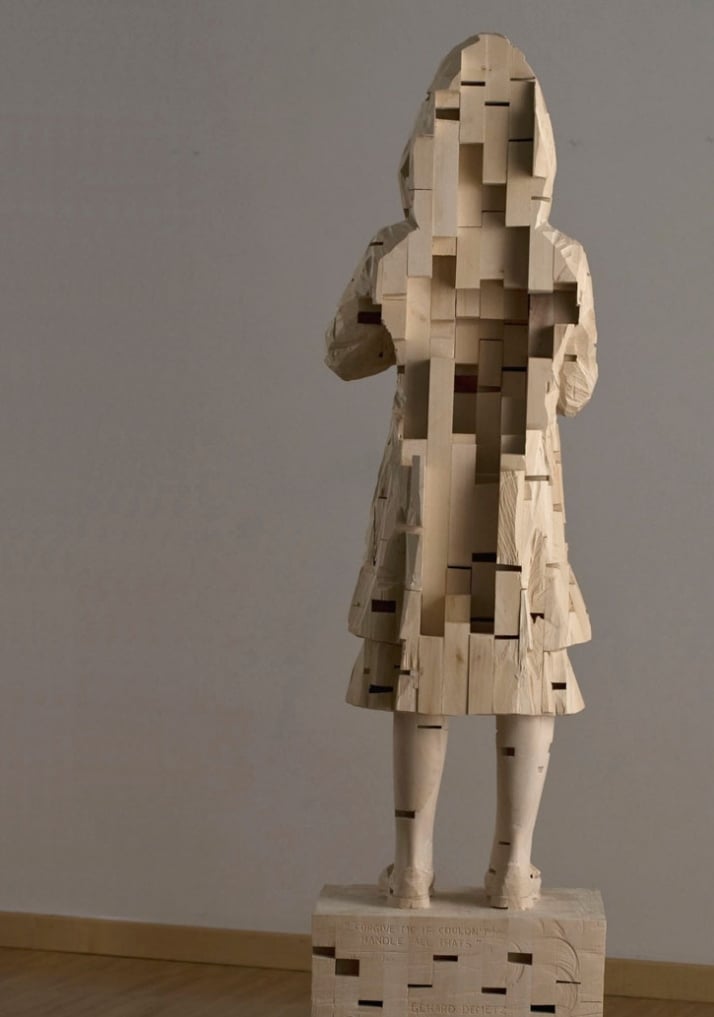
Courtesy Galleria Rubin, Milano,
Photo by Martino Gerosa // www.flickr.com/photos/martinogerosa
How do you feel about the fact that your sculptures provoke strong feelings to the people that are almost forced to have an intense reaction when they get in touch with your work? I imagine you watching from a corner with a smile in your face.
I like that everybody interprets my work based on their feelings, depending on their past, experiences and background, constructing their own stories. My greatest ambition is to start a dialogue between my sculptures and those who look at them.
"I am sorry to have forgotten the dreams I mode as child", © Gehard Demetz, 2010, wood, 170 x 37,5 x 31 cm,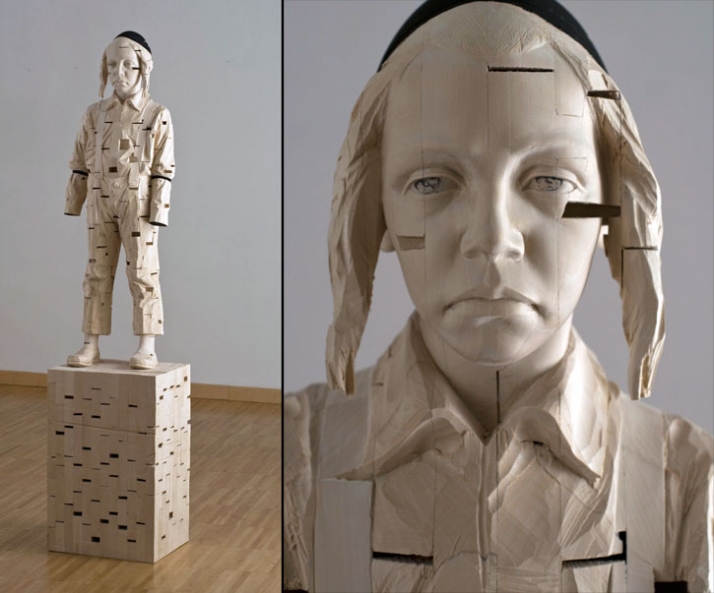
Courtesy Galleria Rubin, Milano,
Photo by Martino Gerosa // www.flickr.com/photos/martinogerosa
Some people have asked us if there is an intention of denouncing child abuse behind your creations. Is that true or your work is just connected with what we generally perceive as the dark side of life?
My subjects transmit the awareness of becoming adults and thus losing, as Rudolf Steiner says, their ability to “listen” to their unconscious. They live with the burden of guilt transmitted from generation to generation, that in fact does not belong to them. They are children who feel sad about not being able to really be children, but who, on the other hand, still have the possibility to choose to become adults, independently, thus freeing themselves little by little of all the influences transmitted by their ancestors. They are witness to all the effort involved in the process of growth and development, which is achieved through individual will and concentration.
Exhibition arrangement of the solo show: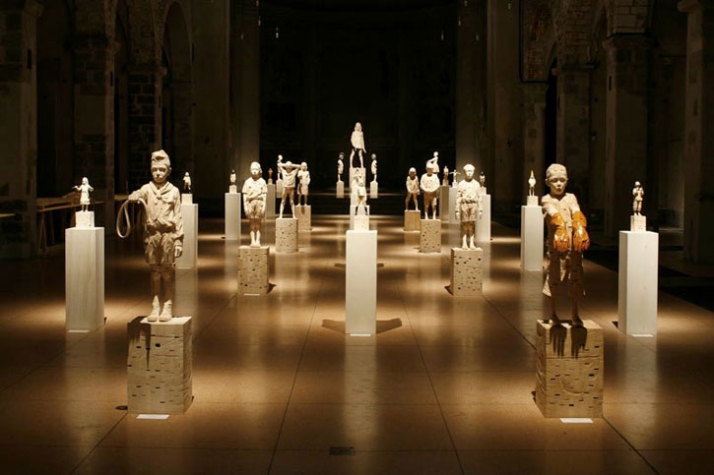
"Love at first touch: Gehard Demetz", curated by C. Antolini, 2009,
in a former San Francesco church, Como, Italy
Courtesy Galleria Rubin, Milano
Photo by Eugenio Castiglioni
Exhibition arrangement of the solo show:
"Love at first touch: Gehard Demetz", curated by C. Antolini, 2009,
in a former San Francesco church, Como, Italy
Courtesy Galleria Rubin, Milano
Photo by Eugenio Castiglioni
"Michelle", © Gehard Demetz, 2009, wood, 172 x 37,5 x 31 cm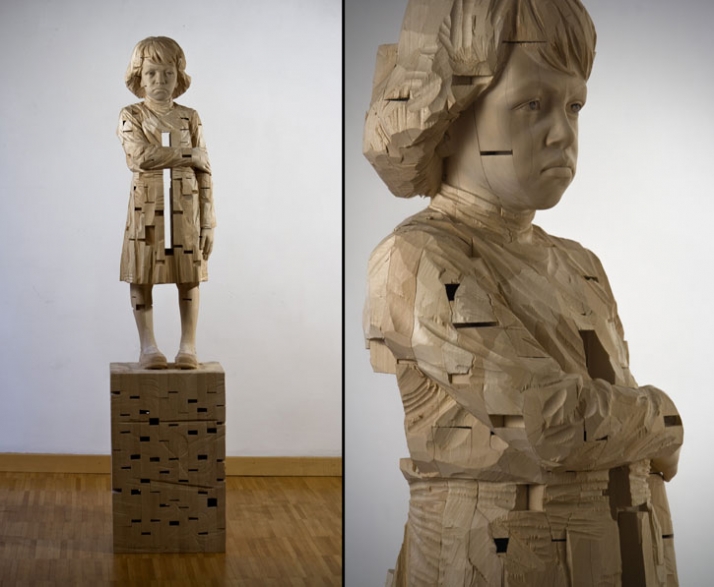
Courtesy Galleria Rubin, Milano
Photo by Alice A. Bosoni
From where do you get your inspiration? Is there any story hidden behind each character? Do you use real models for your sculptures?
By reading and living. I try to create a dialogue, to raise questions and to think over possible answers with every sculpture. I work with pictures of children, overleaping them with those of adults. I want the child to transmit through his movements and expression the feeling of a grown up.
The artist in his studio with the sculpture:
"I want to be flexible", © Gehard Demetz, 2007, wood, 320 x 79 x 87 cm
Courtesy Galleria Rubin, Milano
Photo by the artist
Exhibition arrangement of the solo show: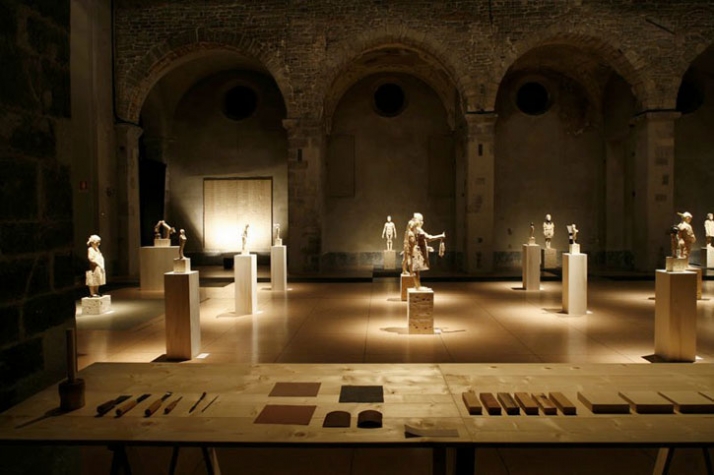
"Love at first touch: Gehard Demetz", curated by C. Antolini, 2009,
in a former San Francesco church, Como, Italy
Courtesy Galleria Rubin, Milano
Photo by Eugenio Castiglioni
Do you think that any form of art is in its core autobiographical? Which part of your own experiences is reflected in your work?
Absolutely. I have always sought answers through studying and reading to what I remember as the most difficult and mysterious moments of my childhood. More often than not, however, I have found the answers to my doubts in the history of my ancestors. In this way, I like to think that the internal dialogues I had as a child were not in total solitude but were a form of conversation with another world.
Exhibition arrangement of the solo show: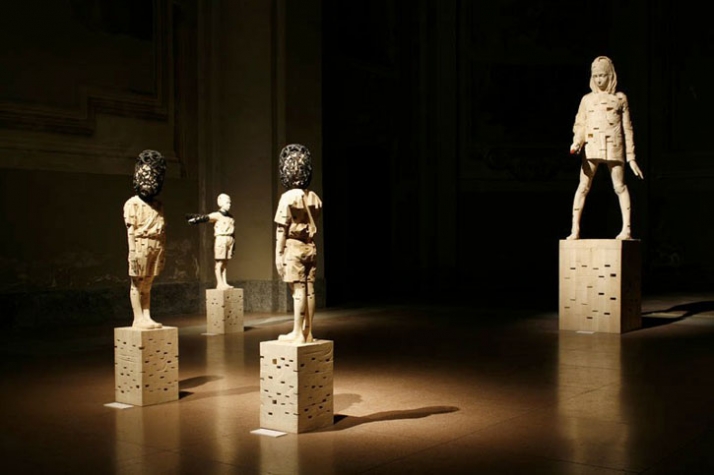
"Love at first touch: Gehard Demetz", curated by C. Antolini, 2009,
in a former San Francesco church, Como, Italy
Courtesy Galleria Rubin, Milano
Photo by Eugenio Castiglioni
The kids in your sculptures seem distant, delicate and at the same time almost threatening. Is fragility and innocence a form of power? Do you think that sooner or later justice puts things in their place?
I put the children in the position of being conscious of their situation or of reacting and obtaining justice on their own.
You live in the mountains of Selva Gardena and I do not know if it is true, but I can’t help thinking of you surrounded by snow, working on your sculptures, trying to put something of the intensity and the calm coldness of snow to them. How does nature and, in general, your surroundings affect your work?
My birthplace has always been important to me and my work, as it gives me the calm and distance I need. But there is one season I don't even feel comfortable at home. Springtime has always stolen me too much energy.
Exhibition arrangement of the solo show: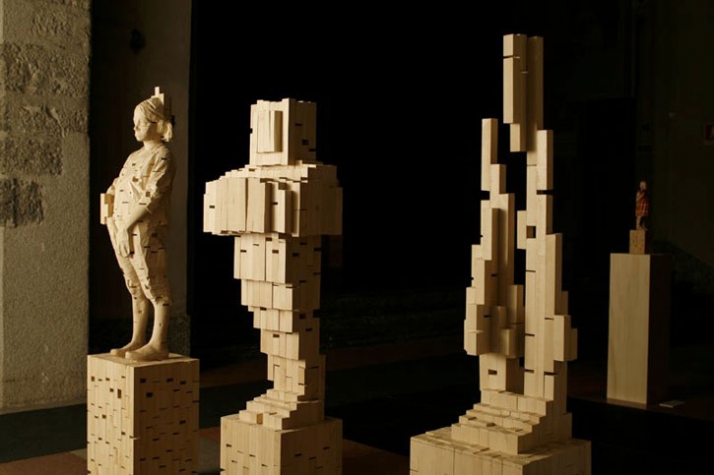
"Love at first touch: Gehard Demetz", curated by C. Antolini, 2009,
in a former San Francesco church, Como, Italy
Courtesy Galleria Rubin, Milano
Photo by Eugenio Castiglioni
.What is left for you to explore? And which are your future plans?
I would like to pick up certain studies and ideas from where I left off some years ago and rethink them in today's world. I am interested in diversity and the conceptual comparison between materiality and transparency, in a figurative sense. I see them as being homogeneous. I am also using new materials to my work. The potential of transparency can transmit a new organic quality to my sculptures, softening the hardness of wood.
The artist in his studio with the sculpture: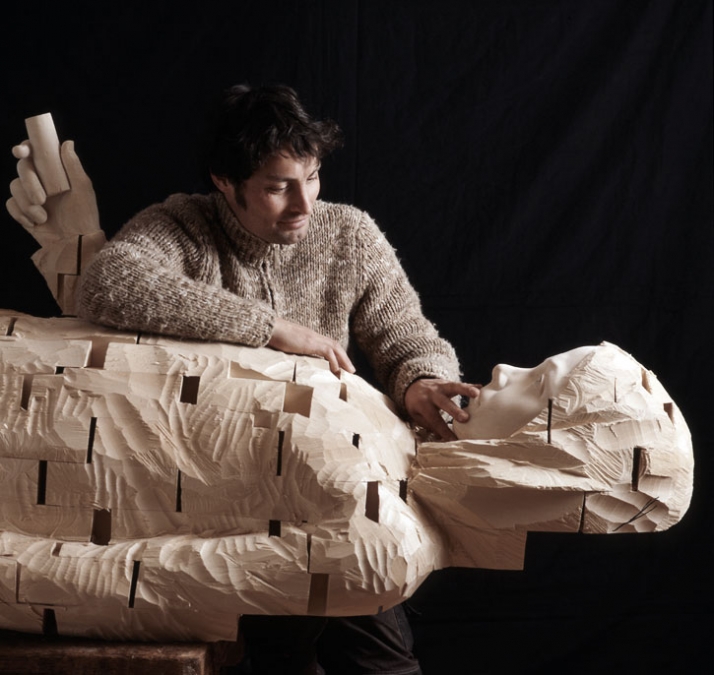
"I want to be flexible", © Gehard Demetz, 2007, wood, 320 x 79 x 87 cm
Courtesy Galleria Rubin, Milano
Photo by Ferdinando Cioffi // www.ferdinandocioffi.com
The dark celebration of Gehard Demetz // 01 October 2009 @ Yatzer
You have stolen my silence, 2006, © Gehard Demetz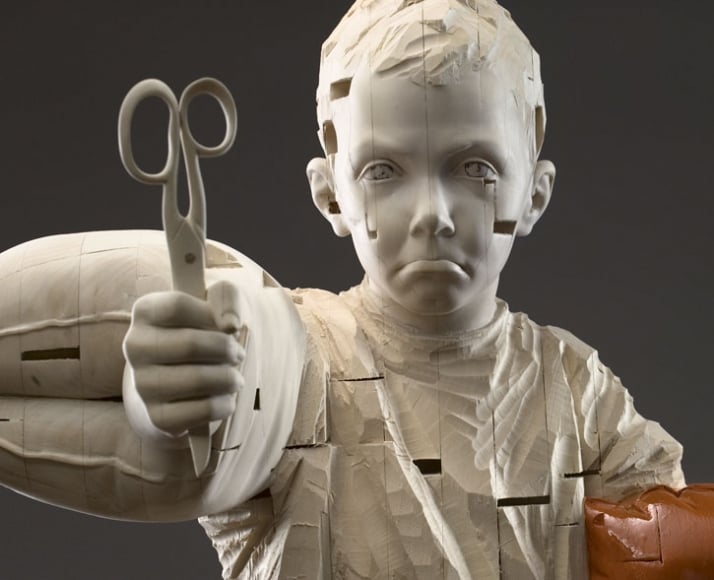
wood, 167,5x55x38 cm
Courtesy Galleria Rubin, Milano
Photo by Egon Dejori
Recent Articles

Jaime Hayon Goes Bestial at His Miami Art Show






